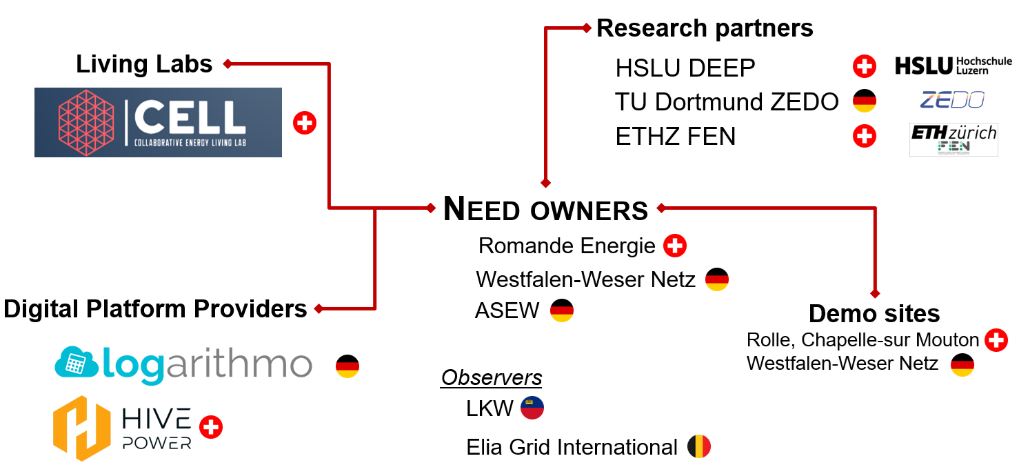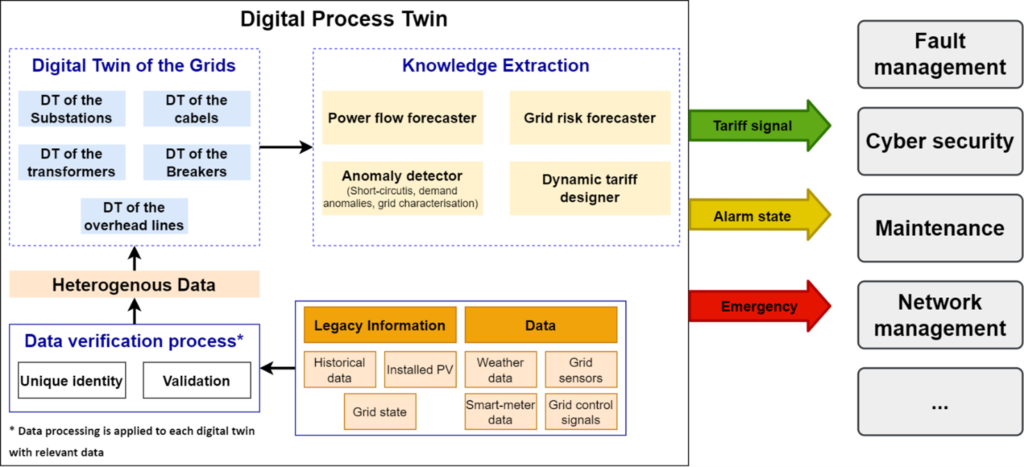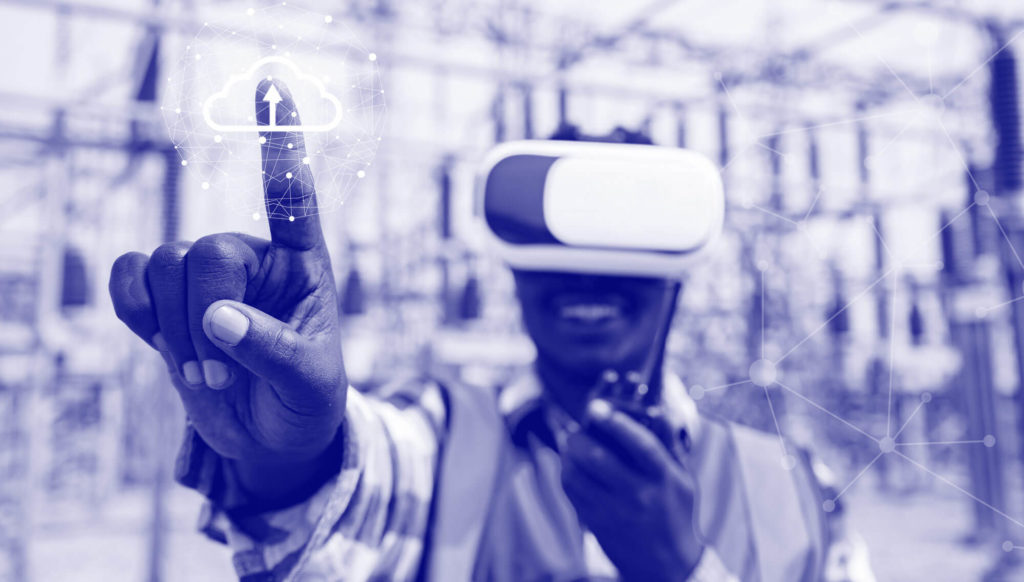We are pleased to share the second newsletter in our ERA-Net project, AISOP. In addition to general updates, it includes a discussion on digital twins for operational planning.
To receive future AISOP newsletters direct to your inbox, subscribe at the bottom of this page.
Who we are: an international consortium from Switzerland and Germany

What we do: data-driven decision support system
AISOP will create an AI-assisted decision support system for electric distribution system operators (DSOs) to drive decarbonisation. AISOP’s models are underpinned by advanced digital technology. The decision-support system securely and privately acquires data using state-of-the-art digital platforms. It then processes and interprets it to generate knowledge. The goal is then to use the extracted information for situational awareness and dynamic tariff setting. Overall, the objective is to use heterogeneous data for the benefit of DSO operational planning. In this way, AISOP expands data-driven techniques for improved operational planning in distribution grids with high shares of DERs by integrating AI- or ML-based solutions, enhanced situational awareness, and market incentives. We combine (i) data access and ingestion, (ii) distribution grid situational awareness, (iii) decision-support for distribution grid management, (iv) dynamic tariffs, and (v) digital platform integration with exploitation through test and training environments.
Logarithmo, as part of the consortium in Germany, is leading the activities in “securely and privately acquiring and processing the data” and establishes the connection between the data supplier and the utility partner in Germany, Westfalen Weser Netz (WWN) to ensure high-quality data to be used for knowledge extraction as part of the decision-support system. In addition to the master data (e.g., installed capacities of PV and grid capacities), historical data and live measurements from the WWN network are received and processed. For further use within the digital process twin, the confidential data by WWN is enriched with publicly available data (e.g., weather data) and brought to a “gold standard”. Resulting high-quality data is then used for the decision support algorithms (e.g., anomaly detection) by ZEDO (TU Dortmund).
Topic #2: Digital (process) twins for operational planning
As distribution grids incorporate more renewable energy sources and demand becomes more flexible, more information about the current and future state of the grid becomes vital for operating the grid in a cost-effective way. Digitalization is therefore essential, as it facilitates data acquisition and processing. Digital process twins (DPTs) can help energy utilities to better manage the operation of their grids by providing a representation of the grid that can help to automate processes, or to simulate different scenarios with the objective of facilitating the tasks of human operators and experts.
AISOP’s vision on DPT described in Figure 2 gives an overview of the main components of a DPT for grid operations. The verified heterogeneous data, each with a unique identification, is an integral part of the DPT. Models of the grid that can use these data are then applied to generate information about the current and future state of the grid, as well as to design electricity tariffs that act as an incentive for engaged users to change their consumption patterns.

Note that the envisioned DPT advocates Single Source of Truth (SSoT) for maintaining the DTs of the grid components as well as the data collected from the field, customers, etc. The data verification process ensures that each digital twin is maintained independently. The database of the digital twins and the “network of digital twins” along with the processed heterogenous data are used by different processes for “knowledge extraction”. Nowadays in the operation of the grid, the knowledge extraction process is performed by human experts and with the help of specialized and customized software. AISOP envisions that part of these processes can be automated, and the human expert can more efficiently take decisions or be provided with recommendations for actions.
The output of the “digital process twin” is multifold: the grid situational awareness (i.e., current and future grid conditions) and the dynamic tariff signals. This information is envisioned to be used by various departments within a distribution system operator such as the teams for fault management, cyber-security, maintenance, network management, etc.
Within the context of the AISOP project, the knowledge extraction activities depicted in Figure 2 are investigated by the research groups in ZEDO (TU Dortmund), FEN (ETH Zürich) and DEEP (HSLU).
Activities & reports or publications (recent past and upcoming)
- Ulf Häger (ZEDO) is leading the taskforce on “Digital Twin” at VDE ETG and their report (in German) is published. The report can be found here. The English version will be published soon.
- The AISOP project report on Task 2.1 Definition and requirements of digital process twin, including DPT-based architecture is published as a deliverable. The report can be found here.
- The AISOP project was presented at the AI4Grids Symposium on “AI in Distribution Grids” organized by HTWG Hochschule Konstanz – Technik, Wirtschaft und Gestaltung. Prof. Dr. Antonios Papaemmanouil represented the AISOP Consortium in Konstanz. The slides can be found here.
- The project was presented at the ABB Energy Efficiency Symposium in Mannheim, Germany which was an excellent opportunity to discuss with the relevant industrial stakeholders.
- The AISOP project will be presented at the ERA-Net SES Project Family Working Group Sessions. The event is public and experts are invited to participate in the online sessions on the following topics:
- Systems Architecture and Implementation Modelling (SAIM)
- Storage and Cross Energy Carrier Synergies (SaCECS)
- Regulatory and Market Development (RaMD)
- Interoperability and Standardisation (ITaS)
- Regional Matters (RM)
- Consumer and Citizen Involvement (CaCI)
Find dates and times for each session as well as link to register here.
- The AISOP project results will be presented at the ETG CIRED Workshop 2023 (DACH) in November in Münich. Please find the link to the event here.
To keep up to date with our progress, subscribe to the AISOP newsletter at the bottom of this page.
Future newsletters will discuss grid state forecasting, risk identification, anomaly detection in active distribution grids, dynamic tariffs, and digital twins applied to distribution systems.
